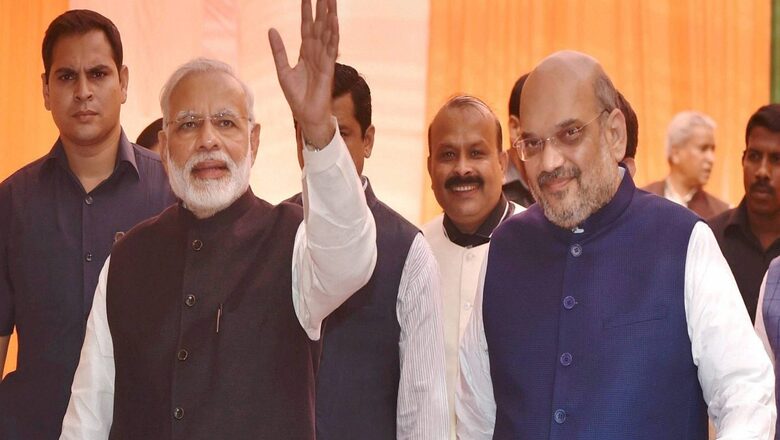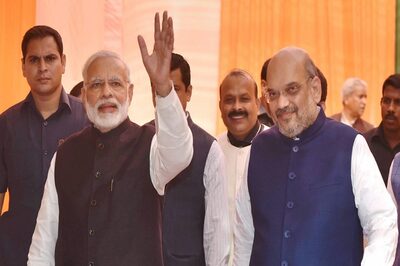
views
Union Home Minister and Minister of Cooperation Amit Shah has come a long way. He is not only the internal security maven but jockeys the nation’s varied cooperative movements. This, in addition to his invaluable contribution to election strategy via the current BJP party president, his own handpick, JP Nadda.
It all began, in a sense, when he and Narendra Modi, one an RSS karyakarta then, and the other who entered the fray via the ABVP, were tasked to infiltrate the powerful cooperative movement at the grassroots level in Gujarat. This meant the credit cooperatives, and principally, the vast milk cooperatives that have some 36 lakh members today. In rural Gujarat political terms, the money and influence/patronage the cooperatives wielded were crucial. The most influential and well-known, Amul, a brand in its own right to rival any, accounts for a turnover of over Rs 60,000 crore today and exports its products to various countries as well.
The cooperative movement in Gujarat, in the nineties, was controlled by the Congress party that also ruled the state. The then BJP leadership saw it as a potent political avenue to come to power in the state. Modi and Shah delivered in spades and developed a special bond, travelling the dusty mofussil roads of Gujarat on foot, motorcycle, and bus. This success catapulted both to power a few years later, Modi as chief minister of Gujarat when he won the elections in 2001. By then he was a well-known figure in rural and urban Gujarat. And Amit Shah came in as his multi-bagging home minister. Shah was also put in charge of several other ministries.
The multiple and consecutive terms that Modi won with a BJP majority in Gujarat, with Amit Shah alongside, paved his way to the Centre as prime minister. Here too, he won with the first absolute majority for the NDA in over 30 years. The last majority government at the Centre had been that of Rajiv Gandhi, who won in the aftermath of the assassination of Prime Minister Indira Gandhi.
Modi has now been in power for two consecutive terms at the Centre and is likely to deliver another win for the NDA in 2024, just round the bend. Amit Shah, in his late fifties now, is widely seen to have the heft, the election-winning savvy, and the administrative experience at the Centre and state to succeed Narendra Modi. He also enjoys the unwavering confidence of the prime minister and that of the ideological fount, the RSS.
The key to his likely elevation to the top job when the time comes, is partially his work with the cooperatives as its first union minister, as of 2021. This, in addition to the Union Home Ministry, traditionally regarded as the number two position in the hierarchy of the Union Cabinet. The crucial thing, of course, is to be a charismatic vote-getter as well as an election strategist. In this too, Amit Shah has had considerable nationwide experience.
Shah has accomplished quite a lot with the Cooperation Ministry too. The Centre is now in the business of controlling the cooperative movement nationally in a much more pointed way. It has, even in the past, overseen the activity from the Agriculture Ministry but it was neglected and not very effective. But now that the cooperative movement has gone beyond just agriculture to labour, construction, and other new areas, in replacement of moribund and often corrupt unions, a new ministry was called for.
Cooperatives are also a state subject, with a registrar for cooperatives in each, but even the RBI oversees the cooperative rural banks. Some analysts have described the cooperative movement as the ‘scaffolding’ that holds up rural India, to give an idea of its importance. For a start, the budgetary support from the Centre for the Cooperation Ministry has been increased seven-fold in under two years. Some taxes on the sugar sector have been removed outright. The MAT (minimum alternate tax), has been reduced to 15 per cent from 18 per cent. The surcharge on cooperative organisations has been reduced to 7 per cent from the erstwhile 12 per cent.
The Centre is computerising cooperative societies to connect them directly to NABARD (National Bank for Agriculture and Rural Development), for which Rs 6,500 crore has been set aside.
Most recently, a newly created National Cooperative Organics Limited (NCOL) will offer organic products under the brand name Bharat Organics. It will ensure the availability of certified organic products in the market. Some 439 laboratories are to be set up around the country for the certification of farm produce. About 50 per cent of the profits from the sale of Bharat Organics products will be transferred directly to member farmers. Six products have been launched already, namely tur dal, chana dal, sugar, rajma, basmati rice, and sona masoori rice. These will be sold via Mother Dairy and Safal outlets, as well as various online platforms. Two more such cooperatives, like NCOL, have also been set up for seeds and exports.
The attempt here is to strike a balance between high fertiliser use in commercial farming, very popular during the Green Revolution that led to India becoming food surplus despite a four-fold increase in population. This is because chemical fertilisers in high use are harmful to the soil and water. So organic is an essentially eco-friendly approach and intended balancer. Amit Shah is also using the police that comes under his Home Ministry to re-energise a national tree plantation drive, with species chosen carefully for their longevity and oxygen-creating abilities.
In the big picture, the Ministry of Cooperation is making out model bylaws to make the cooperatives multi-purpose/functional. The computerisation of cooperatives is well underway. To drive the movements to the grassroots, some two lakh new societies are being formed at the panchayat/village level.
There are many cooperative activities on the anvil. A thrust is being given to decentralised granaries/grain storages under the cooperative movements, to ensure near-home food security. Common e-service centres are being set up for ease of access. The cooperatives are to be used to distribute LPG, set up retail stores at petrol pumps, and take on new petrol/diesel dealerships. They are to set up generic medicine outlets and establish fertiliser distribution centres. They will set up drone manufacturing for multiple uses, develop more extensive micro-financing and rural credit centres, maintain the piped water supply, set up decentralised solar plants for electricity, and so on.
The cooperative movements can well be an alternate method to energise the hinterland apart from the rural mandi system. The sugar cooperatives of Maharashtra, for example, are the basis of the strength of the NCP and the Pawar family. When it is driven from the Centre by the BJP, it has implications and great potential at the national level.
It may be early days for the Ministry of Cooperation, set up only in July 2021, but the prospects are excellent as a power driver in five-year time. That Amit Shah could benefit hugely from his administration of this ministry is no doubt.
The writer is a Delhi-based political commentator. Views expressed in the above piece are personal and solely that of the author. They do not necessarily reflect News18’s views.



















Comments
0 comment